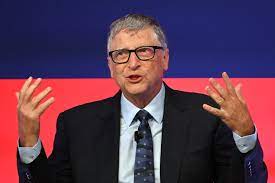Artificial intelligence (AI) is determining the destiny of humanity in nearly every industry and transforming our environment. Bill Gates, co-founder of Microsoft, published a blog post on Tuesday in which he discussed the future of artificial intelligence and described its development as the most significant technological advancement in decades.
In a seven-page note titled “The Age of AI has Begun,” Mr. Gates wrote, “The development of AI is as fundamental as the invention of the microprocessor, personal computer, Internet, and mobile phone.” It will alter how individuals work, learn, travel, obtain health care, and communicate. Industries will reorient themselves around it. Businesses will be distinguished by how well they utilise it.
He discussed two significant technological advancements that he considers revolutionary in his own life.
In 1980, the graphical user interface emerged as the foundation for contemporary operating systems.
The second was in 2022, when he challenged OpenAI to train an artificial intelligence to pass an Advanced Placement biology exam, which they accomplished within a few months. He praised the invention of ChatGPT and stated that it inspired him to consider what AI could accomplish in the next decade.
Mr. Gates also discussed how the world can derive benefits from AI, as well as the obstacles it presents. He wrote, “I’ve been thinking a lot about how AI can reduce some of the world’s worst inequalities, in addition to making people more productive.” He focused on the workforce, healthcare, and education as sectors that AI could transform.
”As computing power becomes less expensive, GPT’s ability to express concepts will become increasingly comparable to having a white-collar worker available to assist you with a variety of tasks,” he wrote while discussing the role of AI in enhancing employee productivity.
In the healthcare industry, Mr. Gates wrote that artificial intelligence (AI) could relieve healthcare employees of certain duties, such as filing insurance claims, completing paperwork, and composing doctor’s visit notes.
“AI-driven improvements will be particularly essential in impoverished countries, where the overwhelming majority of deaths among children under five occur. Many people in these countries never see a doctor, and AIs will increase the productivity of the health professionals they do see,” the note states.
Mr. Gates predicted that artificial intelligence could transform education within the next five to ten years by delivering content tailored to students’ learning patterns and by learning what motivates and disinterests students individually.
”Artificial intelligences can assist instructors and administrators in a variety of ways, including assessing a student’s comprehension of a subject and advising on career planning. Teachers are already utilising tools such as ChatGPT to provide feedback on student writing assignments, he wrote.




